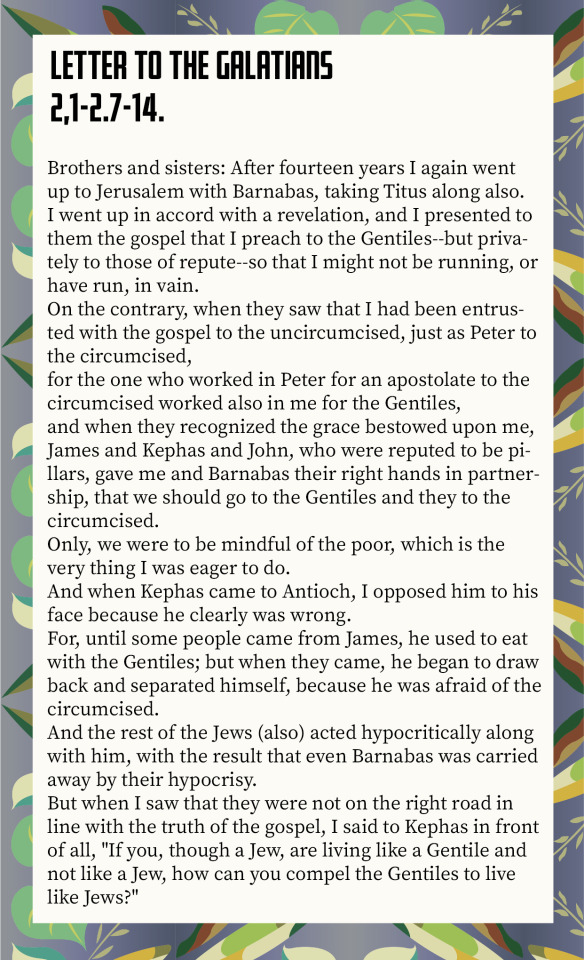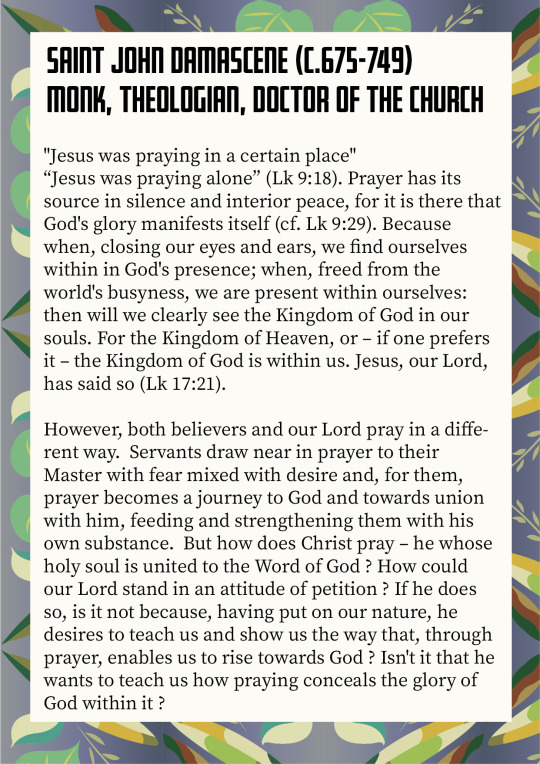#Letter to the galatians
Note
two silly questions for your scholarly mind, if it pleases
firstly: do you think it is more likely that Paul was married but separated or widowed, or that Paul never married?
and secondly: based on what we know of Paul's life, what do you think was the thorn in Paul's side that he mentions in 2 Corinthians 12?
I'm going to start with the second question, because this was something that had interested me. The Church Fathers seem split as to whether the "thorn in [Paul's] flesh" refers to a disability (Anselm of Canterbury, Bede the Venerable, Jerome), a serious temptation of some kind (Hugh of Saint-Cher), or the persecutions he faced on behalf of the Gospel (John Chrysostom, Ambrose of Milan, Theophylact of Ohrid).
I don't really have a strong argument for one of these possibilities over the other, but I will say that emotionally, I have an attachment to the disability interpretation; my "born again" moment roughly coincided with my own diagnosis of a chronic auto-immune disease, and so I often read 2 Corinthians 12:9-10 through the lens of my illness.
As for whether Paul was married, I don't know. It was normative for Pharisees, and is normative for Rabbis, to be married; while it was not universally required, there were at least some times and places where ordination would not be granted to unmarried men, studying certain forms of theology was limited to married men, and membership in the Sanhedrin required one to be married. Given Paul's adherence to the Law and his being "a zealot for [his] ancestral traditions," (Galatians 1:14) it would make sense that he was married. I don't know, though.
#Christianity#Catholicism#Saint Paul#2 Corinthians#Anselm of Canterbury#Saint Ambrose of Milan#Theophylact of Ohrid#Saint Jerome#Saint Bede#disability#temptation#persecution#Judaism#marriage#asks#Letter to the Galatians
7 notes
·
View notes
Photo





Readings for 1 January
1/1/2023
#Book of Numbers 6#Book of Numbers#Psalms 67(66)#Psalms#Letter to the Galatians 4#Letter to the Galatians#Holy Gospel of Jesus Christ according to Saint Luke 2#Holy Gospel of Jesus Christ according to Saint Luke#Pope Francis#God#Lord#Jesus#Holy Spirit#love#hope#heaven#life#peace
1 note
·
View note
Text
48/66 Headpiece to Galatians by Simon Brett
48/66 Headpiece to Galatians by Simon Brett
Wood engraving by Simon Brett (British b. 1943) in The Reader’s Digest Bible (illustrated edition) 1990

View On WordPress
#Abraham#Bible#Bible illustration#bondwoman#freedom#Galatians#Hagar#headpiece#Isaac#Ishmael#Law#Letter to the Galatians#Phillip Medhurst#Readers Digest#sacrifice#Sarah#seed of Abraham#Simon Brett#stars#vignette#wood engraving
0 notes
Text
2024 JANUARY 01 Solemnity of Mary Mother of God Monday
"Brothers and sisters: When the fullness of time had come, God sent his Son, born of a woman, born under the law, to ransom those under the law, so that we might receive adoption. So you are no longer a slave but a child, and if a child then also an heir, through God."
~ Galatians 4:4-5,7
#bible#verse#scripture#second reading#Letter to Galatians#brothers#sisters#fullness of time#God#Lord#sent#Son#Jesus#Christ#born of a woman#under the law#release ransom#receive adoption#no longer a slave#child#heir
0 notes
Note
Hello fellow tumbler user janot, I have a pure breed fool and he has found a plastic gun, when fired a red cloth flag pops out with "Bang" printed in black lettering. I am greatly concerned about him having this vile object, it is against my pure Christian family and household. I am considering selling him to a butcher do you have any recommendations?
Hello epicsadman, as per Galatians 5:12, it would be impermissible to sell a clown to a butcher as killing a clown is akin to killing a child. If you truly feel that strongly about the toy gun, I would suggest seeking out couple’s religious counseling with your clown. Perhaps you can work out your differences with the help of a spiritual adviser. However, to offer my perspective, if God didn’t want clowns to have little toy guns that go ‘bang’, he wouldn’t have made little toy guns that go ‘bang’ so much fun to play with. Just as how god wouldn’t have made pool noodles if he didn’t want us to hit our snotty little brothers with them. If you really can’t find a solution, perhaps try replacing the flag that says ‘bang’ with a flag that says ‘JESUS OF NAZARETH’
I wish you the best and god bless.
#asks#clown husbandry#clownblr#clown posting#clowncore#clowns#clown#please send me more stuff like this#it’s so much fun
409 notes
·
View notes
Photo

The Letters of Paul the Apostle to the Gentiles
Paul was a member of the Jewish Pharisees in the 1st century CE, who experienced a revelation of the resurrected Jesus Christ. In this vision, Jesus commissioned him to be the apostle (herald) to the Gentiles (non-Jews). After this experience, he traveled widely throughout the Roman Empire, spreading the "good news" that Jesus would soon return from heaven and usher in the kingdom of God on earth.
In the New Testament, we have 14 letters traditionally assigned to Paul, but the scholarly consensus now recognizes that of the 14, seven were written by Paul:
1 Thessalonians
Galatians
Philemon
Philippians
1 & 2 Corinthians
Romans
2 Thessalonians, Ephesians, and Colossians remain debatable among some scholars. The other major letters (1 &2 Timothy and Titus) were most likely written by disciples of Paul’s, using his name to carry authority. The letters that have survived range between 52 and 60 CE, and although we cannot pinpoint when Paul’s letters were collected, Clement, a bishop in Rome in the 90s CE, quoted from 1 Corinthians.
The Nature of the Letters
We understand these letters to be circumstantial. They were not written as systematic theology or as treatises on Christianity. The letters are responses to specific problems and circumstances as they arose in his communities. Paul spent time in cities establishing a group and then moved on. He received letters and sometimes reports with detailed questions or advice on how to settle conflicts. Unfortunately, when Paul’s letters were saved and circulated, the original letters from the communities were not preserved. The reconstruction of the original problems can only be determined by Paul’s responses.
Known as the most famous convert in history (from the Acts of the Apostles), Paul did not actually undergo conversion. Conversion assumes changing from one religious system to another, but at the time, there was no Christian system for him to convert to. Paul himself was ambiguous when it came to his self-identity:
To the Jews I became like a Jew... To those under the law I became like one under the law (though I myself am not under the law) ... To those not having the law I became like one not having the law (though I am not free from God’s law but am under Christ’s law) ... I have become all things to all people. (1 Corinthians 9:20-22)
In relation to what happened to Paul, it is better to follow what he says, in that he was 'called'. This is the tradition of the way in which the Prophets of Israel were called to their individual missions.
I want you to know, brothers and sisters, that the gospel I preached is not of human origin. I did not receive it from any man, nor was I taught it; rather, I received it by revelation from Jesus Christ. (Galatians 1:11-12).
Paul argued that this experience gave him as much authority as the original circle in Jerusalem (Peter, James, and John). Paul’s call to be the Apostle to the Gentiles was shocking because, as he freely admitted, he had previously "persecuted the church of God" (Galatians 1:13). He never really explained what he did, nor why he did it. It is in Paul’s letters that the name Jesus is combined with Christ, the Greek for the Hebrew messiah ("anointed one"). Understood as a title, "Jesus the Christ", it became common as a phrase that indicated his identity and function.
Continue reading...
74 notes
·
View notes
Text


The άνάλαβος (analavos) is the distinctive garment of a monk or a nun tonsured into the highest grade of Orthodox monasticism, the Great Schema, and is adorned with the instruments of the Passion of Christ. It takes its name from the Greek αναλαμβάνω (“to take up”), serving as a constant reminder to the one who wears it that he or she must “take up his cross daily” (Luke 9:23). The ornately-plaited Crosses that cover the analavos, the polystavrion (πολυσταύριον, from πολύς, “many,” and σταυρός, “Cross”) — a name often, though less accurately, also applied to the analavos — reminds the monastic that he or she is “crucified with Christ” (Galatians 2:20).
With regard to each image on the analavos, the rooster represents “the cock [that] crowed” (Matthew 26:74; Mark 14:68 Luke 22:60; John 18:27) after Saint Peter had “denied thrice” His Master and Lord (John 13:38).
The pillar represents the column to which Pilate bound Christ “when he scourged Him” (Mark 15:15) “by Whose stripes we were healed” (Isaiah 53:5; I Peter 2:24).
The wreath garlanding the Cross represents the “crown of thorns” (Matthew 27:29; Mark 15:17; John 19:2) that “the soldiers platted” (John 19:2) and “put upon the head” (Matthew 27:29) of “God our King of old” (Psalm 73:13), Who freed man from having to contend against “thorns and thistles in the sweat of his brow” (Genesis 3:18-19).
The upright post and the traverse beam represent the stipes and the patibulum that formed “the Cross of our Lord Jesus Christ” (Galatians 6:14), upon which “all day long He stretched forth His hands unto a disobedient and gainsaying people” (Isaiah 65:2; Romans 10:21).
The four spikes at the center of the Cross and the hammer beneath its base represent the “nails” (John 20:25) and hammer with which “they pierced” (Psalm 21:16; John 19:37) “His hands and His feet” (Luke 24:40). when they “lifted up from the earth” (John 12:32) Him Who “blotted out the handwriting of ordinances that was against us by nailing it to His Cross” (Colossians 2:14).
The base upon which the Cross stands represents “the place, which is called 'Calvary' (Luke 23:33), or 'Golgotha', that is to say, the Place of the Skull” (Matthew 27:33), “where they crucified Him” (John 19:18) Who “wrought salvation in the midst of the earth” (Psalm 73:13).
The skull and crossbones represent “the first man Adam” (I Corinthians 15:45), who by tradition “returned unto the ground” (Genesis 3:19) at this very spot, the reason that this place of execution, “full of dead men’s bones” (Matthew 23:27) became the place where “the last Adam was made a quickening spirit” (I Corinthians 15:45).
The plaque on top of the Cross represents the titulus, the “title” (John 19:19-20), with “the superscription of His accusation” (Mark 15:26), which “Pilate wrote” (John 19:19) “and set up over His head” (Matthew 27:37); however, instead of “Jesus of Nazareth the king of the Jews” (John 19:19), which “was written over Him in letters of Greek, and Latin, and Hebrew” (Luke 23:38), the three languages being an allusion to the Three Hypostases “of the Father, and of the Son, and of the Holy Spirit” (Matthew 28:19), this titulus reads, “The King of Glory” (Psalm 23:7-10), “for had they known it they would not have crucified the Lord of glory” (I Corinthians 2:8).
The reed represents the “hyssop” (John 19:29) upon which was put “a sponge full of vinegar” (Mark 15:36), which was then “put to His mouth” (John 19:29) when in His “thirst they gave Him vinegar to drink” (Psalm 68:21), Him of Whom it was said that “all wondered at the gracious words which proceeded out of His mouth” (Luke 4:22).
The lance represents the “spear [that] pierced His side”; “and forthwith came there out blood and water” (John 19:34) from Him Who “took one of Adam's ribs, and closed up the flesh instead thereof" (Genesis 2:21) and Who “washed us from our sins in His own blood” (Revelation 1:5).
The plaque at the bottom of the Cross represents the suppedaneum of Christ, “His footstool” (Psalm 98:5), “the place where His feet have stood” (Psalm 131:7). It is slanted because, according to one tradition, at the moment when “Jesus cried with a loud voice, and gave up the spirit” (Mark 15:37), He allowed a violent death spasm to convulse His legs, dislodging His footrest in such a manner that one end pointed upwards, indicating that the soul of the penitent thief, Saint Dismas, “the one on His right hand” (Mark 15:27) would be “carried up into Heaven” (Luke 24:51), while the other end, pointed downwards, indicated that the soul of the impenitent thief, Gestas, “the other on His left” (Mark 15:27), would “be thrust down to Hell” (Luke 10:15), showing that all of us, “the evil and the good, the just and the unjust” (Matthew 5:45), “are weighed in the balance” (Ecclesiasticus 21:25) of the Cross of Christ.
The ladder and the pincers beneath the base of the Cross represent the means of deposition by which Saint Joseph of Arimathea, “a rich man” (Matthew 27:57) who “begged for the body of Jesus” (Matthew 27:58; Luke 23:52), “took it down” (Luke 23:53), so that as in body He descended from the Cross, so in soul “He also descended first into the lower parts of the earth” (Ephesians 4:9), “by which also He went and preached unto the spirits in prison” (I Peter 3:19).
Through these instruments, “the Cross of Christ” (I Corinthians 1:17: Galatians 6:12; Philippians 3:18) became the “Tree of Life” (Genesis 2:9; 3:22, 24; Proverbs 3:18, 11:30; 13:12; 15:4; Revelation 2:7; 22:2,14), by which the Lord Jesus reified His words that, “I am the resurrection, and the life: he that believeth in Me, though he were dead, yet shall he live, and whosoever liveth and believeth in Me shall never die” (John 11:25-26).
[source]
17 notes
·
View notes
Text

IF JESUS HAD DIED IN 2000
Paul would be writing his various letters* in the 2020's
*the letters that most scholars consider genuine; Galatians, 1 Thessalonians, 1-2 Corinthians, Romans, Philipians & Philemon
- a generation later and having never known Jesus in person
Gospel of Mark won't be written until around the 2030's
- with no claims of Jesus' virgin birth, ascension and divinity
Gospel of Matthew won't be written until around the 2040's
- with the first record of virgin birth, Bethlehem origin, guards & angel at tomb
Gospel of Luke won't be written until around the 2050's
- with the first record of a post-resurrection Jesus eating, appearing & disappearing and ascension to heaven
Gospel of John won't be written until around the 2060's
- with the first record of the incarnation of Jesus (god-man), divinity claims of Jesus, the seven "I am" sayings of Jesus and Jesus' lengthy discourse with Pilate
This sure sounds like something that people just made up.
#christianity#jesus christ#bible#gospels#bible study#saint paul#gospel of mark#gospel of matthew#gospel of luke#gospel of john#resurrection myth#resurrection#virgin birth#virgin birth myth#origin of the bible#obvious fiction#religion#religion is a mental illness
134 notes
·
View notes
Text
How can I recognize manipulation in myself and others?

2 Corinthians 12:16-19
Some of you admit I was not a burden to you. But they still think I was sneaky and took advantage of you by trickery. But how? Did any of the men I sent to you take advantage of you? When I urged Titus to visit you and sent our other brother with him, did Titus take advantage of you? No, of course not . . . Everything we do, dear friends, is for your benefit.
Taking advantage of others for our own benefit is manipulation. A manipulator tries to gain things at others’ expense.
Proverbs 12:20
Deceit fills hearts that are plotting evil; joy fills hearts that are planning peace!
Jeremiah 9:5
They all fool and defraud each other; no one tells the truth. With practiced tongues they tell lies; they wear themselves out with all their sinning.
1 John 4:6
But we belong to God; that is why those who know God listen to us. If they do not belong to God, they do not listen to us. That is how we know if someone has the Spirit of truth or the spirit of deception.
Deceiving someone to get what we want or to make ourselves look good is manipulation. If we find ourselves twisting the truth to get what we want, we are probably being manipulative.
Amos 5:11
You trample the poor and steal what little they have through taxes and unfair rent. Therefore, you will never live in the beautiful stone houses you are building. You will never drink wine from the lush vineyards you are planting.
Amos 8:5-6
You can’t wait for the Sabbath day to be over and the religious festivals to end so you can get back to cheating the helpless. You measure out grain with dishonest measures and cheat the buyer with dishonest scales. And you mix the grain you sell with chaff swept from the floor. Then you enslave poor people for one piece of silver or a pair of sandals.
Cheating is often a form of manipulation. It is a plan to take something we don’t deserve because we feel entitled to it. It changes the landscape of fairness.
Mark 12:40
But they shamelessly cheat widows out of their property, and then, to cover up the kind of people they really are, they make long prayers in public. Because of this, their punishment will be the greater.
Hypocrisy —when what we say doesn’t match what we do – is a form of manipulation. We pretend to be a better person than we really are in order to get something we want. If we need to put on a façade for others, chances are we are being manipulative.
Nehemiah 6:9, 14, 19
They were just trying to intimidate us, imagining that they could break our resolve and stop the work. So I prayed for strength to continue the work . . . Remember, O my God, all the evil things that Tobiah and Sanballat have done. And remember Noadiah the prophet and all the prophets like her who have tried to intimidate me . . . They kept telling me what a wonderful man Tobiah was, and then they told him everything I said. And Tobiah sent many threatening letters to intimidate me.
Intimidation is a form of manipulation. When the manipulator can’t entice, he may try to intimidate or pressure you into submission.
Galatians 4:17
Those false teachers are so eager to win your favor, but their intentions are not good. They are trying to shut you off from me so that you will pay attention only to them.
Isolation is often a form of manipulation. We should cautious when someone tries to isolate us from Christian influence. Whether it is an intentional attempt to manipulate us or not, it can have a dangerous impact on our faith.
Judges 14:15-17
Samson’s wife came to him in tears and said, “You don’t love me; you hate me! You have given my people a riddle, but you haven’t told me the answer.” “I haven’t even given the answer to my father or mother,” he replied. “Why should I tell you?” So she cried whenever she was with him and kept it up for the rest of the celebration. At last, on the seventh day, he told her the answer because of her persistent nagging. Then she gave the answer to the young men.
Emotional pressure, nagging, and guilt are often used to manipulate. If we use these weapons, we are guilty of manipulation. Instead of these, self-control, encouragement, and forgiveness should be our tools for building relationships.
Romans 16:18
Such people are not serving Christ our Lord; they are serving their own personal interests. By smooth talk and glowing words they deceive innocent people.
Proverbs 7:21
So she seduced him with her pretty speech. With her flattery she enticed him.
Jude 1:16
These people are grumblers and complainers, doing whatever evil they feel like. They are loudmouthed braggarts, and they flatter others to get favors in return.
1 Thessalonians 2:5
Never once did we try to win you with flattery, as you very well know. And God is our witness that we were not just pretending to be your friends so you would give us money!
Psalm 12:2
Neighbors lie to each other, speaking with flattering lips and insincere hearts.
Flattery is often used to manipulate. It can be difficult to tell the difference between a sincere compliment and a false one. This is why we tend to be so vulnerable to flattery disguised as compliments.
Daniel 6:5-7
So they concluded, "Our only chance of finding grounds for accusing Daniel will be in connection with the rules of his religion." [6] So the administrators and high officers went to the king and said, "Long live King Darius! [7] We are all in agreement-we administrators, officials, high officers, advisers, and governors-that the king should make a law that will be strictly enforced. Give orders that for the next thirty days any person who prays to anyone, divine or human-except to you, Your Majesty-will be thrown into the den of lions.
Pride makes us particularly susceptible to flattery. King Darius was manipulated into endangering his most trusted advisor, Daniel, because of his pride.
1 Thessalonians 5:11
Proverbs 27:6
Proverbs 28:23
Love and truth form the difference between flattery and encouragement. Encouragement finds the good in others and inspires them to greater good. Flattery says what makes others happy with us—not necessarily what is true. It is better to inspire a friend with hard truths than leave them lost with gentle lies.
Proverbs 21:14
A secret gift calms anger; a bribe under the table pacifies fury.
Exodus 23:8
"Take no bribes, for a bribe makes you ignore something that you clearly see. A bribe makes even a righteous person twist the truth.
Proverbs 15:27
Greed brings grief to the whole family, but those who hate bribes will live.
Bribery is a dangerous form of manipulation, because it seems well-intentioned. Sometimes, to avoid an awkward rejection of a gift, we simply take it. But gifts and other benefits tap into our natural and good desire to respond in kind—which tilts our judgment at a deep yet subtle level.
Matthew 7:15
“Beware of false prophets who come disguised as harmless sheep but are really vicious wolves.
Beware of false prophets who come disguised as harmless sheep, but are really wolves that will tear you apart.
Jude 1:8
Yet these false teachers, who claim authority from their dreams, live immoral lives, defy authority, and scoff at the power of the glorious ones that pretends to be the Good News but is not the Good News at all. You are being fooled by those who twist and change the truth concerning Christ.
False prophets and false teachers are manipulators. They pretend to have good news for us, but they are really seeking to take from us.
#christian blog#jesus#bible reading#christian doctrine#bible scripture#glorytogod#biblical#bible#faith in jesus#bible study#read your bible#bible verse#bible devotions#follow jesus#jesussaves#jesus is coming#belief in jesus#jesus christ#gospel#faith in god#godly living#godly wisdom#kingdom of heaven#king james bible#christian faith#christian bible#christainity#christian living#bibleposting
13 notes
·
View notes
Text

“For you have been called to live in freedom, my brothers and sisters. But don’t use your freedom to satisfy your sinful nature. Instead, use your freedom to serve one another in love.” —Galatians 5:13
“Free to Choose” By Wendy Richmond:
“We have been called to live in freedom. I’m not sure you and I can fully grasp the concept of living in freedom since most of us have not physically lived in captivity. But all of us once lived in the captivity of sin. Paul writes in his letter to the Romans that we become slaves to whatever we choose to obey, whether sin or righteousness (Romans 6). Christ has set us free from the captivity of sin, but the interesting thing about freedom is that it comes with a little thing called choice.
Even though you are no longer serving sin unknowingly, you can still choose it as your master. You can choose to satisfy your sinful nature. Paul says, “Don’t use your freedom that way.” Serving the sinful nature will keep you bound up in misery and won’t benefit the people around you. “Instead,” Paul says, “Use your freedom to serve one another in love.” This is a beautiful, wise, rewarding, and God-honoring choice.” Amen!🙏🕊🙌
#galatians 5:13#freedom in christ#god cares about you#god loves you#christian prayer#praying to god#bible verses#bible truths#bible scriptures#bible quotes#bible study#the word of god#christian devotionals#daily devotions#bible#christian blog#god#belief in god#faith in god#jesus#belief in jesus#faith in jesus#christian life#christian living#christian faith#christian inspiration#christian encouragement#christian motivation#christianity#christian quotes
29 notes
·
View notes
Text
According to Biblical scripture, sin is presented as a force that is inherent in human nature, but not insurmountable – a challenge that calls for discipline and spiritual guidance to overcome. Passages like Romans 6:14 assure the faithful, stating, "For sin shall no longer be your master, because you are not under the law, but under grace." This encapsulates the mighty promise that, through faith and the grace extended by God, believers have the power to resist and rule over sin.
Moreover, the Bible teaches that with the guidance of the Holy Spirit, one can exercise self-control, one of the fruits of the Spirit found in Galatians 5:22-23. The letters of the Apostle Paul, especially, delve into the concept of dying to one's sinful nature and being reborn in the spirit of righteousness—a powerful metaphor for the transformative power of faith.
In the book of James, chapter 4, verse 7, the Bible also encourages believers to "Submit yourselves, then, to God. Resist the devil, and he will flee from you." This passage underscores the importance of willful submission to divine will as a strategy for sin control, promising that with such surrender comes victory over temptation.
Another important scripture, 1 Corinthians 10:13, offers both solace and strategy, affirming that God is faithful and "will not let you be tempted beyond what you can bear." This verse speaks volumes about the divine support system in place for those who strive to control sin—it reassures us that there is always a way out or a means to bear up under temptation, empowering every believer with hope and perseverance.
And let us not forget the wisdom of Proverbs, where in chapter 28, verse 13, it is stated, "Whoever conceals their sins does not prosper, but the one who confesses and renounces them finds mercy." In these words lies the promise of forgiveness and renewal—a reminder that acknowledging our wrongdoings is the first step to mastering them.
Unearthing these scriptural treasures gives us invaluable insights into how the Bible directs us to confront and control sin. By turning to these ancient texts, we gain wisdom that continues to guide and inspire countless individuals in their quest for spiritual growth and moral integrity.

7 notes
·
View notes
Text

God on His Throne, engraving by Matthäus Merian the Elder, circa 1625-1630.
You will arise and have compassion on Zion
for it is time to show favor to her;
the appointed time has come.
- Psalm 102:13
This arising, this standing up, means the sweetest and most gracious becoming human on the part of God, for here He has come to us so that He may lift us up to Himself.
- Martin Luther, Lectures on the Psalms
What time? But when the fullness of time had come, God sent forth His Son, made of a woman, made under the Law [Gal 4:4]. And where is Zion? To redeem them that were under the Law [Gal 4:5a]. First, then, were the Jews; for thence were the Apostles, thence those more than five hundred brethren [1 Cor 15:6], thence that later multitude, who had but one heart and one soul toward God.
- Saint Augustine, Expositions on Psalm 102 (§14)
Lord, You live in the hearts of Your saints, and so have built up Zion. May You always show Your greatness through their good works. Amen.
- English Psalm-Prayer given at the end of Psalm 102 in the Catholic Liturgy of the Hours
#Christianity#Catholicism#Lutheranism#Book of Psalms#Martin Luther#Incarnation#theosis#Saint Augustine#Ecclesia#Letter to the Galatians#1 Corinthians#Lamb of God#Book of Revelation#heaven#angel#Liturgy of the Hours#prayers
15 notes
·
View notes
Text




Readings for 5 October
5/10/2022
#Jesus was praying in a certain place#Letter to the Galatians 2#Letter to the Galatians#Psalms 117(116)#Psalms#Holy Gospel of Jesus Christ according to Saint Luke 11#Holy Gospel of Jesus Christ according to Saint Luke#Saint John Damascene (c.675-749)#God#Lord#Jesus#Holy Spirit#love#hope#heaven#life#peace
0 notes
Text
Previously, on Apocrypals part 5: The Fifth One
As we begin our sixth (!) calendar year of Apocrypals, here is a list of the texts we have covered so far on the show in case you want to read along or catch up. They’re arranged in a way that appeases my systematic nature.
Tanakh/Old Testament:
Genesis (episodes 16-20)
Exodus (episodes 33 and 35)
Leviticus (episode 59)
Numbers (episode 62)
Deuteronomy (episode 65)
Joshua (episode 73)
Judges (episode 80)
Ruth (episode 45)
1 Samuel (episode 89)
2 Samuel (episode 90-91)
1 Kings (episode 99)
2 Kings (episode 106)
Esther (episode 37)
Job (episode 101)
Ecclesiastes (episode 52)
Song of Songs (episode 34)
Isaiah (episode 4)
Jeremiah (episode 43-44)
Lamentations (episode 48)
Ezekiel (episode 55-56)
Daniel (episode 2)
Hosea (episode 108)
Jonah (episode 31)
Micah (episode 74)
Nahum (episode 74)
Deuterocanon/capital-A Apocrypha:
Tobit (episode 13)
Judith (episode 22)
Greek Additions to Esther (episode 37)
1 Maccabees (episode 27)
2 Maccabees (episode 28)
3 Maccabees (episode 53)
4 Maccabees (episode 78)
The Prayer of Azariah aka the Song of the Three Holy Children (episode 2)
Susanna (episode 2)
Bel and the Dragon (episode 2)
The Prayer of Manasseh (episode 6)
New Testament:
Matthew (episodes 8-9)
Mark (episode 7)
Luke (episode 10)
John (episode 11-12)
Acts of the Apostles (episode 1)
Romans (episode 5)
1 Corinthians (episode 25)
2 Corinthians (episode 42)
Galatians (episode 72)
Ephesians (episode 81)
Hebrews (episode 104)
1 John (episode 49)
2 John (episode 49)
3 John (episode 49)
Revelation (episode 50)
Pseudepigrapha (Jewish apocrypha):
The Testament of Solomon (episode 24)
The Story of Ahikar (episode 14)
The Ascension of Isaiah (episode 6)
1 Enoch (episode 39-40)
2 Enoch (episode 61)
3 Enoch (episode 86-87)
Jubilees (episodes 82 and 83)
The Letter of Aristeas (episode 70)
The War of the Sons of Light Against the Sons of Darkness (episode 71)
Joseph and Aseneth (episode 93)
New Testament apocrypha:
The Protevangelium aka Infancy Gospel of James (episode 29)
The Acts of Pilate/Gospel of Nicodemus (episode 23)
Mors Pilati/Death of Pilate (episode 23)
The Acts of Paul and Thecla (episode 22)
The Acts of Peter (episode 3)
The Acts of Peter and Paul (episode 3)
The Acts of Andrew and Matthias (episode 60)
The Acts of Thomas and His Wonderworking Skin (episode 66)
The Life of Xanthippe, Polyxena, and Rebecca (episode 57)
Questions of Bartholomew (episode 41)
Resurrection of Jesus Christ by Bartholomew (episode 41)
The Book of Bartholomew (episode 67)
Acts of John (episode 46)
The Acts of Andrew (episode 97)
Syriac Infancy Gospel (episode 47)
Infancy Gospel of Thomas (episode 54)
Infancy Gospel of Pseudo-Matthew (episode 79)
The Adoration of the Magi (2020 Christmas bonus episode)
The History of Joseph the Carpenter (episode 103)
The First Apocryphal Apocalypse of John (episode 68)
The Second Apocryphal Apocalypse of John (episode 68)
The Third Apocryphal Apocalypse of John (episode 68)
The Apocalypse of Peter (episode 75)
The Apocalypse of Paul (episode 95)
The Gospel of Philip (episode 92)
The Gospel of Mary (episode 92)
The Gospel of Jesus’s Wife (episode 92)
The Gospel of Judas (episode 100)
The Greater Questions of Mary (episode Secret 69)
The Golden Legend of Jacobus de Voragine:
The Life of Saint Nicholas (episode 26)
The Life of Saint Lucy (episode 26)
The Life of Saint Christopher (episode 15)
The Life of Saint Benedict (episode 15)
excerpts from The Passion of the Lord (episode 23)
The Life of Saint Sebastian (episode 58)
The Life of Saint Blaise (episode 58)
The Life of Saint Agatha (episode 58)
The Life of Saint Roch (episode 63)
The Life of Saint Catherine of Alexandria (episode 77)
The Life of Saint Barbara (episode 77)
The Life of Saint Dunstan (episode 85)
The Life of Mary Magdalene (episode 94)
The Life of Saint Martha of Bethany (episode 102)
The Life of Saint Margaret of Antioch (episode 102)
Other:
Historia Trium Regum/The Legend of the Three Kings by John of Hildesheim (episode 30)
Muirchu’s Life of Saint Patrick (episode 36)
The Life of Saint Guinefort (episode 63)
The Life of Saint Mary of Egypt (episode 69)
The Life of Saint Pelagia (episode 69)
The Life of Saint Martin by Sulpicius Severus (episode 76)
The Life of Saint Columba (episode 84)
The Life of Saint Wilgefortis (episode 94)
Lives of cephalophoric saints (bonus episode cephalo4)
Stories of the Baal Shem Tov from The Golden Mountain (episode 96)
More stories of the Baal Shem Tov from The Golden Mountain (episode 107)
Solomon and Ashmedai (bonus episode double chai)
Listener questions (episode 32)
Bible trivia questions (episode 38)
Halloween-themed Chick tracts (episode 51)
Christmas-themed Chick tracts (episode 98)
Bible Adventures and the Wisdom Tree catalogue of video games (episode 64)
The Da Vinci Code, the movie (episode 88)
Guess the Bible character from Persona 5 (bonus episode Persona 5)
El Shaddai: Ascension of the Metatron (episode 105)
You can find links to all these episodes with show notes and more on the Apocrypals wiki
#apocrypals#podcast#podcasts#religion#bible#christianity#judaism#apocrypha#old testament#new testament#hagiography
88 notes
·
View notes
Text
2023 JANUARY 01 Sunday
"As proof that you are children, God sent the spirit of His Son into our hearts, so you are no longer a slave but a child, and if a child then also an heir, through God."
~ Galatians 4:6-7
#bible#scripture#bible verse#reading#Paul#epistle#letter#Galatians#proof#children#slave#child#heir#spirit#hearts#God#Lord#Jesus#Christ
0 notes
Text
Living His Word

Therefore, brothers, be all the more diligent to confirm your calling and election, for if you practice these qualities you will never fall.
— 2 Peter 1:10
There are many ways to characterize and summarize the way of life disciples of Jesus Christ are called to follow.
At one point, Jesus himself characterized the new life in terms of fruit. He said, '"You did not choose me, but I chose you and appointed you that you should go and bear fruit and that your fruit should abide"' (John 15:16). In this passage, the whole point of the Christian life is characterized as a bearing of fruit, fruit that will last.
In one of his letters, The Apostle Paul summarized the Christian way of life as a life of faith. He said, ". . . the life I now live in the flesh I live by faith in the Son of God, who loved me and gave himself for me" (Galatians 2:20). From this perspective, the whole point of the Christian life is to take the walk of faith.
In our verse for today, the Apostle Peter gives us another way to summarize and characterize the Christian way of life. It is a life that should confirm our election and call by God. The life we live as disciples, in other words, should confirm the fact that we have been truly transformed by the blood of the lamb.
How does Peter believe that we can confirm our election and call? He says that we need to practice certain qualities. What qualities are they? In the previous verses he lists them. He says, "For this very reason, make every effort to supplement your faith with virtue, and virtue with knowledge, and knowledge with self-control, and self-control with steadfastness, and steadfastness with godliness, and godliness with brotherly affection, and brotherly affection with love" (2 Peter 1:5-7).
If we analyze Peter's list, we see that most of the words on the list are attempts to capture the Christian way of life as a life of moral excellence. Take "virtue" for instance. A virtuous person is one who is righteous and good in every respect. "Steadfastness" indicates a person who is firm in his resolve to follow and obey the commands of God and Jesus Christ. And a person who exhibits "love" is a person who is obedient to the greatest commandment and to the second one that is like it.
Our life of faith in Jesus Christ, our fruit-bearing life, is a life that reveals we have been elected and called. Although those diligent about living it may stumble, they will never fall (Psalm 37:24).
© 2016 by Bible League International
11 notes
·
View notes